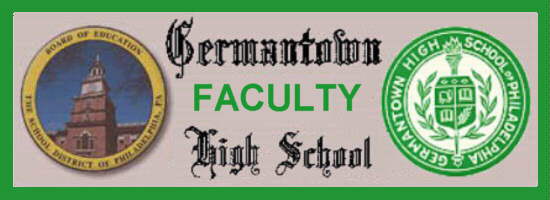
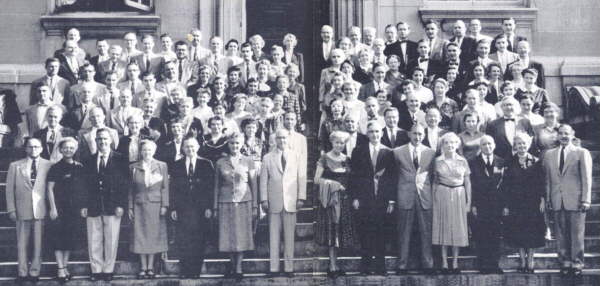
***** Assistant to the Principal *****
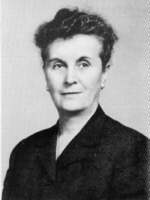 Miss Virginia Raacke |
||
I knew a very few teachers at Germantown at all beyond the classroom and no administrators. I didn’t have a very clear sense of what administrators did during the day, no sense at all of whether they were pleasant or good-humored. They lived behind closed doors in the center of the school and had titles that suggested they occupied this place or that in an academic hierarchy that meant very little to me. And yet I think I can say that Mrs. Raacke, whom I barely knew at all, changed the course of my life. One day late in my senior year she called me to her office, where I remember taking a seat. Had I filled out the application yet, she asked, which announced which college I would attend if I were to win one of the city scholarships? No, I hadn’t, I replied. But in my family, I explained, it was always understood that we would go on Temple University, a privilege my mother had always told me that she had longed for but was unable to realize. I didn’t share this last with Mrs. Raacke, but I think now that she knew that most of us students at Germantown would be the first generation in our families to go to college. Next, Mrs. Raacke asked me if I were interested in going to the University of Pennsylvania. I told her that I was. Penn was, after all, further down the subway line from my home than Temple. It was, therefore, slightly more exotic. It belonged to something called the “Ivy League,” although I hadn’t the vaguest idea why this was supposed to be impressive. Had I applied to Penn, she wanted to know. I replied that I had not. Had I taken any of the College Board exams, she asked. I said that I had taken the morning exams. All the while she asked me these questions, Mrs. Raacke was crisp, business like. I wasn’t taken wholly by surprise by this interest in my college prospects. Mrs. Raacke was famous for steering talented girls towards Bryn Mawr. My dear friend Judith (Lefkowitz) had already regaled me with stories of Mrs.Raacke pouring over a Bryn Mawr College yearbook with her, pointing out familiar and beloved college halls. (In fact Judith went to Bryn Mawr on a full scholarship). But I wasn’t used to being a notable person at school. I was one of the writers, yearbook, newspaper, and by nature we writers prefer quiet places and even some solitude. Suddenly, it seemed to me, Mrs. Raacke was on the phone, speaking to admissions officers at Penn. “I have in my office,” she said, “our little valedictorian. Can you look at her College Board exams and tell me if you will accept her at Penn.” So that was how I was noticed, I remember thinking. It was true that I had won the contest for writing the valedictory, although I would certainly not graduate first in the class (so who was that? Lois? Nadine?) I squirmed slightly in my seat, imagining how abysmal my exam scores were in all likelihood. I barely functioned in mathematics and, while I wrote and read well, I didn’t have the kind of quickness that translates well into good scores on those tests. Mrs. Raacke seemed to be responding to replies on the other end of the telephone. When she hung up, she told me with efficient brevity that I would be accepted at Penn and that I must go home and ask my parents if I could go to Penn if I should win a scholarship from the city. She returned to her work as I left, probably going through a pile of other seniors’college plans, looking to see whom she might shift and to where. So I did ask my parents. And they said yes. And I did win one of those scholarships, and I went to Penn. I met a wider world at Penn and began the odyssey that would take me away from my home. Perhaps it would have all worked out the same anyway, even if I had gotten off the subway a few stops earlier. But it is the campus at 34th and Walnut that is the backdrop of memory against which I replay the formative years when I grew up. In that sense Mrs. Raacke was my stage manager, my producer, my director. Miriam Brody
|
***** Art *****
 Mrs Sklar |
||
Mrs. Sklar was a warm, jovial woman who instilled in me a sense of confidence. She always had something positive to say about my work. She entered one of my watercolors in a PSFS contest. I would never have been able to do this myself. I did win a prize. She guided me through the experience of gathering together a portfolio for my entrance exam to the Museum School of Art . She made me feel good about my work. I don't think that I would have gained entrance to this school without her. I attended for a year before becoming engaged to be married. That was how it was in those years. I still regret not finishing, although I married a wonderful man and had two wonderful sons. She did show me that I did have choices in life although I chose marriage. Sandy Snyder
|
***** English *****
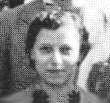 Miss Rose Glassberg |
||
Ms. Glassberg was a small person, like myself. She laughed a good deal in class. She was very precise and expected a lot from her students. I remember a misquote she said one time, "If literature be the food of life, read on", which I thought was the cleaverest thing I'd ever heard at the time. She listened to me which I thought was pretty cleaver, too. After I experienced teaching, I realized how difficult it is to really hear what your students are trying to express and not have them notice your eyes glazing over. Ann Mottershead
| ||
I now understand that she was very hard on some students. But she was generous and challenging to me. Salinger published Catcher in the Rye in 1951. Miss Glassberg said I should read it , I guess it was senior year. It was after I had been in her class. And then there was WB Yeats … there are still lines from his poetry floating through my mind “Turning, turning in the widening gyre, the falcon cannot hear the falconer…”, Auden, and many others. It must have been because I had an eager hungry look on my face. Reading was another ticket away from the things in my life I hated. So this woman spent extra time giving me books to read and then figuring out what times we could get together to discuss them. I had 3 English teachers, as I remember, Miss Glassberg, Mr. Kline (11th grade journalism) and Miss Steele. I really disliked Mr. Kline. He was uptight and a bully.) These other 2 women challenged me and deepened my love of literature taking me to places I might have spent years in discovering. Whenever I read, I think of them. How do you say “thank you” for such a gift? Lois Addison
| ||
When I heard that Miss Glassberg was going to attend the reunion I was so pleased because of all the teachers I had at GHS I remember her best of all. Miss Glassberg was the only teacher I ever had that was as passionate about theater as I was. Her reading of Shakespeare was inspirational and from time to time she would have me read OUT LOUD with her. As nervous as this made me, I think I not only learned my English lessons from her but also a great deal about acting. I was struggling to find myself at the time but when I was in her class I felt somehow more at home than in any other class. Miss Glassberg was teaching English but I was learning much more than that. I was learning where in this life I belonged. How to relate to other actors...adults. I have never forgotten those readings of Hamlet. I didn't know I could read a line until Miss Glassberg showed me I could. A great sense of humor, good taste in clothes and always had an interesting question for me. How was my dancing coming along? Had I been to the theater lately? Or, was I appearing anywhere? Questions that helped wake me up to what I was really trying to accomplish in this life. Thank you Rose Glassberg for your dedication and your passion for teaching. I learned much from you. I am forever grateful for your help.
Here's wishing you all the best.
|
||
 Miss Kohler |
||
Miss Kohler was my English teacher for at least four semesters in Germantown High. She looked very sober and unsmiling, and had beautiful pale skin, and a slight line of a mouth. I never remember her smiling, but I remember her nice even white teeth and her neatly combed, but crinkly gray or salt and pepper hair, pulled away from her face. She must have been in her late forties or early fifties when she was my teacher. People seem older to young people, so she might have been younger. I loved to read, and when I came to America, I read comic books, children’s books, and the various “romance” or “true love story” magazines. I also read the “true detective” magazines, and the magazines about movie stars. I also read novels and biographies, and poetry. Miss Kohler flamed my love of reading and brought it to new heights by introducing me to the great writers in English Literature, both in fiction and poetry. Reading books had been my escape, and my joy from the time I was a very little girl. I had never liked school or teachers very much, and with the exception of Miss O’Brien my teacher in McCall’s School, I had never had a personal relationship with any teacher, and I did not with Miss Kohler either. (This would change when I went to college and made life long friends with a few of my professors.) In Miss Kohler’s class, however, I felt an invisible connection between us. I loved what she was talking about – books. I loved that she discussed the characters in the books, and they became more than the black and white words that were read and accepted as printed. I learned to think about the characters in the books, and wonder why they did certain things, made certain choices. I began to think about the writers writing, about the writers at work. Again, I don’t think I ever voluntarily put up my hand in her class to ask a question, or participate in a discussion, but I was all ears to what she and other students had to say about the books or plays we were reading. I began to understand that writers weren’t gods but only humans who wrote words and sentences and thought out plots for these books and plays. Poetry, which I have always considered the finest form of writing, was something else to be understood, but differently. I think I had started to keep an almost daily journal about the time I started high school; perhaps a year or so earlier. I also had begun to write poetry, but I made no connection to my own writing, and the writings of published authors. Miss Kohler, unlike the other teachers I had, got through to me. I don’t know why. Perhaps she and I shared the love of reading, literature, but then other teachers I had had, and would have, did also. But I think Miss Kohler loved the subject she taught, and her calm voice, without drama, introduced me to some of the great dramas in English literature. Because I have the ability to memorize poetry and text easily, I was able to shine somewhat when we had memorization and recitations assignments, but because I was desperately shy, these assignments were torturous to me, because I had to stand up and face the class, when I recited. There is a brand of faucets and of kitchen and bathroom fixtures that have the brand name “Kohler”. Whenever I have seen them, I have always thought of, been grateful for being Miss Kohler’s student. Elga Stalte
|
||

Miss Steele |
||
Not all memorable and beloved teachers are warm and lovable. Miss Steele was probably near retirement when she taught us. She was rather austere tough, sometimes a bit scary. But she was relentless in trying to move us along. She would say “You think you work hard now, wait until you get to college.” She tried to prepare us, especially women I now tend to think, for what she knew lay beyond. After all she was a Bryn Mawr graduate. She expected excellence. Her sense of humour was subtle. We read the Addison and Steele ‘Spectator Papers’. She would talk about the fact that her grandfather had been born in Britain and hopefully was related. I would proudly state that my FATHER was born in Scotland. To this day I don’t know if we are related to Addison of Addison and Steele. But in this little game I was always a generation ahead. I would smile with a sense of superiority that only a 16 or 17 year old could muster. She treated me with a kind of affectionate severity that one might imagine coming from a great Aunt. What she conveyed to me was the sheer love of literature. I smile when I think of her and see her picture. I wish I knew what her life had been like what was she like as a person? I appreciate all she tried to do for me. Lois Addison
|
||
 Mr. Weisbein |
||
Mr. Weisbein was a kind and gentle man with a soft voice. He must have recognized some intelligence in me (was it 10th grade?), and he spoke to me with respect. That meant a lot to me. Also, I remember that at a parent-teacher's evening, he was very nice to my mother, and he communicated to her (and I was there, so I heard it too) his sense that I was a good student. We all appreciate others' kindness, and in those vulnerable years when teachers were "gods," we may have had an especially strong need for approval, acceptance, and respect. Marlene Oscar (Berman)
|
***** Language *****
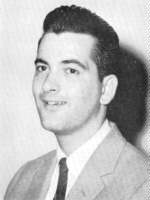 Mr McCoy |
***** Mathematics *****
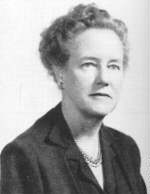 Dr Anne Mullikin |
||
Dr Mullikin was a "Great" and "Fair Lady", and fairness is something that holds great importance to me. I had her for Geometry and Solid Geometry. There was nothing special about it other than her being an excellent teacher. My real respect for her happened when I was in Algebra 4. I believe it was with Krimins, but wouldn't swear to it. In any case, him and I had a difference of opinion over a test on "Quadratic Equations". When we were unable to resolve the problem on our own, he took me to see Dr. Mullikin. She asked me what was going on and I told her my side of the story. She then asked me to explain the steps I took to solve the problems in question. Right after telling her, the bell rang. She told me to go to my next class and she'd take care of it. From that point on there were no more problems in algrbra 4. The most impressive thing to me was her even handed approach to the problem.. Something you don't always see. George Fetherman
|
||
In retrospect, I think Dr. Mullikin was quite unusual. She was a very bright woman who seemed to love teaching, and she also was a nice person. She recognized math talent in me, and she was easy to praise. Of course that made me feel good. In part because of her attitude (and her teaching skills), I loved geometry. I felt as though the theorems and axioms were a tool for creatively solving puzzles, and I got lots of pleasure from seeing solutions unfold before my eyes. Dr. Mullikin also tactfully tried to line up my image with my math talents. She told me that chewing gum detracted from my appearance: A smart girl need not chew gum because it didn't look good. Although I never took her advice, at least I knew that I shouldn't chew gum in public if I am to appear sophisticated. Marlene Oscar
|
||
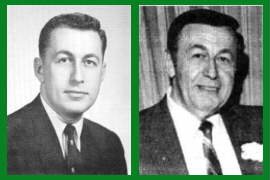 Mr Mervin L. Krimins Born: September 1, 1925 Died: November 3, 1995 |
||
Mr. Krimins was not only an excellent teacher, but he also had a great sense of humor. He knew how to keep unruly kids in line, and somehow he used his humor as disciplinary technique. Our particular class didn't need much discipline, however, so he just kidded around more than any other teacher I can remember. I used to enjoy being in his classes just to hear him kibitz, and I also learned a lot. Marlene Oscar
|
||
Being an art student, math was certainly not my strong point. I absolutely dreaded it. Mr. Krimins had a way of making it bearable by way of his sense of humor. He was a teddy bear of a man and it didn't hurt that he was nice looking. He watched me struggle with algebra and then had me come after school to try to teach me the fundamentals. My father had put a lot of pressure on me to do well, which only made me more nervous. I would walk into math class shaking & walked out petrified. Mr. Krimins tried to make me approach the subject with some laughter. He also spoke to my parents about getting me a tutor. This helped get me by, but only barely. He gave me a huge lesson in ethics and taught me to cope with my fear of math. He would be hysterical if he had known that I married an actuary and even learned some actuarial science while working with my husband in business for 30 years. Part of my tasks as being an officer of our company has been keeping the books, which to this day I continue to do. He was a good man who took an interest in his students. Sandy Snyder
|
***** Physical Education *****
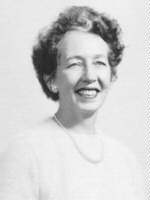 Miss Hildegarde Duffy |
||
I remember Ms. Duffy as having a warm smile that contrasted sharply with her somewhat brusque manner. The smile always won out over the brusqueness. Ms. Duffy seemed to be an accomplished athlete who clearly wanted to teach would-be athletes or even those of us who had some hidden athletic talent. Recognizing that I had the latter, she always encouraged me to learn various gymnastic maneuvers. Consequently, I spent more time in the gym than I would have otherwise, and I usually accomplished more than I would have imagined. I derived much pleasure from: hanging upside down on the rings and flipping over backwards; jumping onto - and over- the horses; and climbing the ropes to the top of the gym.
Marlene Oscar (Berman)
|
||
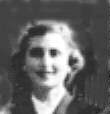 Mrs Jones |
||
Mrs. Jones was the remedial gym teacher. She was one of the warmest, most loving women. For those of us who had some physical problems and were unable to take regular gym classes she gave us special attention so that we didn't feel different. I had and continue to have back problems, and she taught me many ways of coping with my physical problems. It was a small class, so she was able to answer any questions we had about what was going on with our bodies, both mentally and physically. We could bring her our problems and knew she would answer them truthfully. My mother had always been very open with me about sex. I knew I could go to her, and that she would answer any questions I may have had, but it was much easier to approach Mrs.. Jones. Included in the course was an antiquated class about marriage and sex. She was far more forward thinking and approached the subject quite easily and practically. We had great discussions about women and their role in society during the fifties. She allowed me to think and talk about problems not usually spoken about in this era. She was a marvelous role model. I learned that I could marry and still be my own person. I learned that I could work and still be a good mom and I truly believe that I inspired my husband to go into business for himself. I became an equal partner in business as well as in our marriage. I owe much to Mrs. Jones. Sandy Snyder
|
||
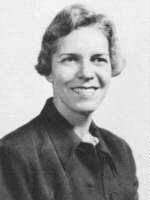 Miss Ruth Moody |
||
 Miss Patricia Pence |
||
Everyone who ever watched her play tennis recognized a beautiful athlete. There was magic in how she moved. Those of us on her tennis team tried very hard to emulate her. While she doesn’t remember, (and that is what teacher/student things are like. To them we are one of a great many, and to us, they are one of a very few), she took me under her wing. She would take me to her apartment, sit me in front of her stereo and play Bach, Delius, Mozart, etc. When she would replace a record in her collection, she would give me the old one. While I had played the piano and the clarinet as a kid, I really hadn’t been exposed to much classical music. Patty Pence began that education in earnest. She opened a door for me that has graced my life as an adult. Obviously music meant a great deal to her. She left phys ed and studied the harp. Before she retired she was the harpist for the Piedmont Symphony Orchestra, in Winston-Salem, North Carolina. She also taught at the North Carolina School for the Arts.
Lois Addison
|
||
 Miss Mary Steger |
||
I have such fond memories of Mary Steger. She was such a thoughtful,helpful, and sincere friend to so many students including me. It always amazed me how she made time each week to discuss my concerns about school, extra-curricular activities, and personal interactions. Her informal mentoring significantly influenced my career and personal life goals. She stimulated my enthusiasm for learning. She helped me zero in on three colleges, which resulted in my attending the University of Pennsylvania on scholarship. I am so grateful to her for gathering faculty support for my appointment to the Germantown Schools Community Council and for motivating me to take on greater leadership responsibilities on Council Committees. I am thankful for all her encouragement that propelled me to volunteer for American Friends Service Committee weekend work camps. These experiences inmy youth led me to invest much personal time over the past 40 years striving to help feed the hungry and help better the living conditions for many others in need. Many years after graduation from college, I had the heartwarming opportunity to lunch with Miss Steger and personally thank her for her all her kindness and support during my happy years at GHS.
Linda Kosmin
|
||
I know that I wrote a bit about Miss Steger in the Memories piece, but there is more. She was a marvelous woman. She was solid there. I would go up to the girls’ phys ed office and hang out. She would give me tasks to do or we would just talk. I remember when she broke her ankle. I used to take a bus over to her apartment on a Friday evening to put out her trash for collection. Those were wonderful evenings. We would talk about all sorts of things studying hard, going on beyond high school, TS Eliot’s Four Quartets, etc. She taught me by just being who she was about enduring intellectual curiosity. Until I started doing the Reunion Booklet, I had no idea of the role she played in other students’ lives, but it does not surprise me. The picture that emerges is of a complex woman who cared a great deal about what happened to students, and how she tried to assist them into positive experiences. You know people often make fun of phys eders making comments that assume that they are not real bright. Nothing could be further from the truth. Mary Steger was a wonderful warm and loving person and an excellent teacher. I really loved her.
Lois Addison
|
***** Social Studies *****
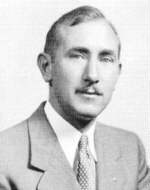 Mr Henry Wagner |
||
I don’t know a single one of my girlfriends from GHS ’57 who didn’t love Henry Wagner’s history classes, or who wasn’t in fact just a little bit in love with Mr. Wagner himself. How old was he then when he taught us? To us he seemed fixed in that indeterminate period just beyond being young, an undifferentiated stage of life in which most other adults, we thought, lived out their pitifully humdrum lives. But there was nothing humdrum about Mr. Wagner. He’d stride into class, ruddy-complected, tweed jacketed, blue oxford shirted (oh how wearing blue made his eyes sparkle!), some kind of Scots highlander tie around his neck (for years, years I bought those kinds of ties for any man I liked) and off we would go into … as I recall it was American History, or Modern European History. He treated us like adults, respected our rights to argue with him, told us dates were less important than knowing the chronology of events, a staple question of his tests – put events in chronological order. Why had no one else told us that there wasn’t a whole lot of intellectual currency in memorizing lists and lists of dates? We thought that’s what history was. Remember the politics of the cold war was raging about us, a time when people thought it was dangerous to sign a petition for human rights. You might get hauled off before a congressional investigating committee, lose your job, or worse. Too many of our teachers seemed complacent. We asked Mr. Wagner what he thought. Someday he told us, we’ll look back on the bombast and demagoguery of our time and judge it harshly. He seemed to love teaching. He convinced me that he did. Rumor had it that a brother of his taught at Temple, as he might have, but that he preferred high school students, our energy, our curiosity. I don’t know if that was true, but it made us feel important and we all tried to live up to his expectations of us. “What is this gregariousness?” he said one day of my chatting with a friend as class was beginning. I had never heard the word before, but I was enchanted with its sound and looked it up later, since if Henry Wagner had given my behavior a label, I needed desperately to know what it meant. The last day of class he told us he wanted to share with us his personal political philosophy. Sitting at my desk, I was too busy being dazzled with the notion of a teacher having a political philosophy at all to be able to retain so many years later the world view he offered us. But it seems to me that across the board he chalked a globe in which trade was free and tariffs were eliminated. Each country would make what it made best, he told us, cheese from France, cars from the USA. Sitting listening to him speak about a better world he imagined, I wasn’t so clear about the meaning of “free trade” but I did know at last that ideas mattered, that conviction mattered, that standards mattered. These were the best lessons of all.
Miriam Brody
|
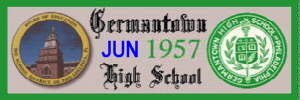 Click Here For Class of June 1957
| 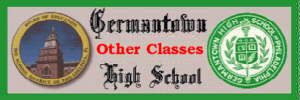 Click Here For Other Classes
| |
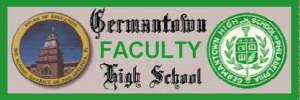 Click Here For 1957 Faculty Page |
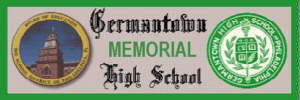 Click Here For Class of 1957 Memorial Page |
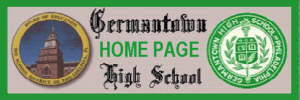 Click Here To Return To Home Page |
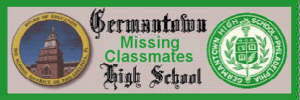 Click Here For Missing Classmates |
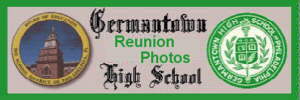 Click Here For Previous Reunion Photos |
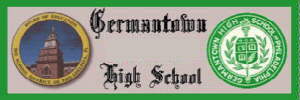 Click Here For Germantown High |
Special Thanks to Katherina Kripl Bonner for sending Lois Her Copy of the June 1957 Yearbook
& to George Palmer for sending Lois His Copy of the January 1957 Yearbook.
This Page Updated 09/01/04 gwf